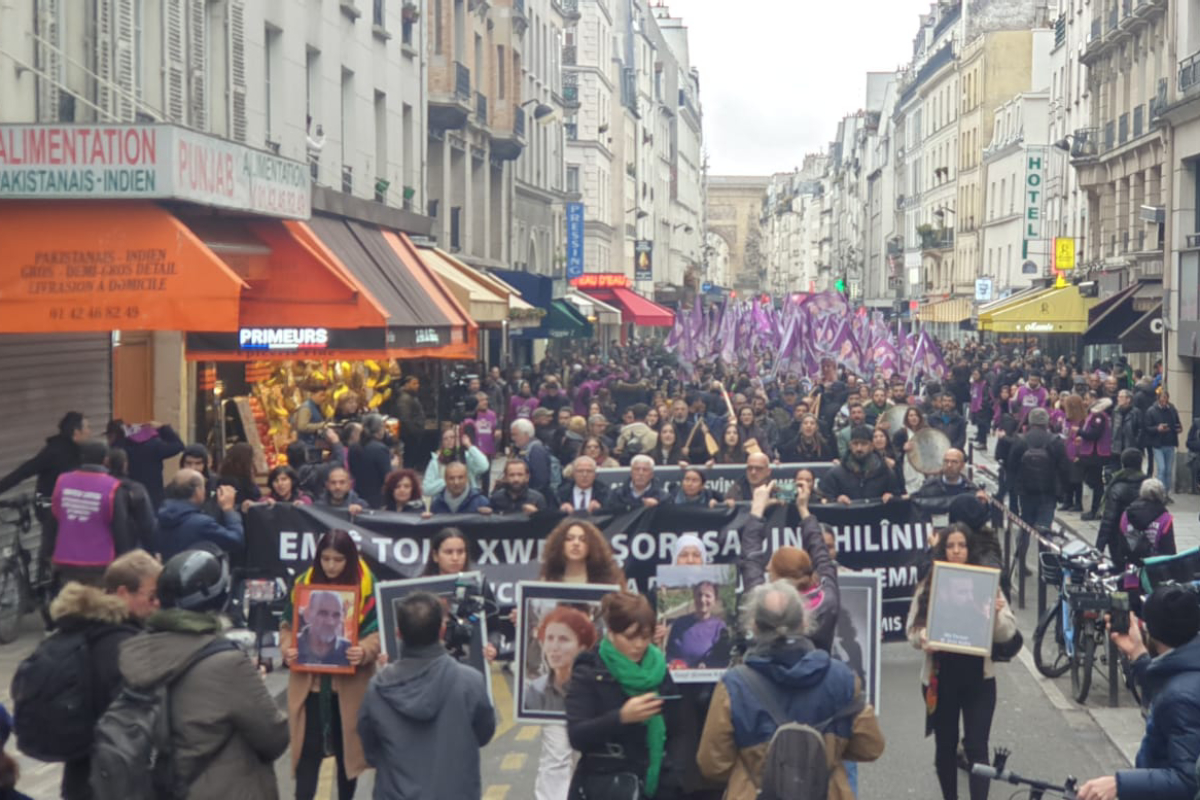‘Tis the holiday season, yet for the denizens of Paris, it seems to have brought more worry than happiness as the Kurdish community in the city stages pitch battles with the police.
Kurds are protesting against the recent attack on the Kurdish Cultural Centre in central Paris. The community is blaming the Turkish secret service for Friday’s racist attack against the Kurds.
Several organisations, including the Kurdish Democratic Council of France (CDK-F) and the Kurdish Women’s Movement in Europe, have accused Turkey’s intelligence agency of murder in a Kurdish neighbourhood in Paris.
Kurdish activists in Paris told The New Indian that about 10 years ago, in the French capital, Sakine Cansız, Fidan Doğan and Leyla Saylemez were murdered by the Turkish secret service.
ALSO READ: Shootout at Kurdish cultural centre: Paris shooter was on bail, French party calls it racist attack
With the latest attack on the cultural centre happening just ahead of the 10th anniversary of the incident, the members of the community feel Turkish intelligence is behind this attack too.
Speaking to The New Indian, a spokesperson from the Kurdish Women’s Movement in Europe said that they staged a protest at noon local time in Paris. They gathered in front of the Kurdish Association this afternoon and walked to Rue Lafayette to the office where three Kurdish women were murdered by the Turkish secret service on January 9, 2013.
In a tweet addressed to President Emmanuel Macron, Agit Polat, spokesperson of the Kurdish Democratic Council in France (CDK-F), said, “The Kurdish community in France feels very unsafe. The Kurds need guarantees and to be heard.”
On Friday, a 69-year-old gunman opened fire on a Kurdish cultural centre and a hairdressing salon in a Kurdish-majority neighbourhood of the French capital. Three people were killed and three others were seriously injured.
Following the incident, thousands of Kurdish agitators and anti-racist activists staged a peaceful protest. However, it soon turned into violent clashes between police and Kurdish activists on Saturday, ahead of Christmas.
The furious demonstrators ransacked vehicles, setting cars ablaze and hurling objects at the police near Place de la République in Paris, close to the Ahmet-Kaya Kurdish cultural centre, where the attack happened on Friday. The police fired tear gas to disperse the mob on Saturday.
The suspect in Friday’s killing is identified as a retired train driver who attempted murders in 2016 and 2021 and was on bail when he opened fire on Friday. La France Insoumise, a left-leaning French political party, termed the attack an act of racism.
“The Kurdish community in Paris had been issuing warnings to the French police about threats made by Turkish fascist groups. Yet, no safety measures were taken,” a Kurdish activist told The New Indian.
Speaking to The New Indian from the protest ground in Paris, Melike Yasar, representative of the Kurdish Women’s Movement in Europe, said, “We are sceptical about the claims that the killer was yet another racist or fascist who is targeting refugees and migrants. The killer did admit that he targeted Kurds specifically. Was he recruited?”
“Moreover, very recently, the Turkish authorities made threats to France, claiming that if the French authorities do not restrict the ‘terrorist’ activities of the Kurdish movement, it will take matters into its own hands. We, therefore, refuse to see this attack as a racist incident. This was a political massacre,” she said.
“Although the Turkish state has admitted being behind the first Paris massacre, the French state’s classification of the case has opened the door to more violence against the Kurdish people in France and Europe more generally,” she added.
“If the same attitude prevails this time, a third massacre will soon follow. This will allow the Turkish state to bring its war on the Kurds to Europe. A fully transparent investigation, one that thoroughly examines any possible role of the Turkish intelligence, is therefore in everyone’s interest,” Yasar said.
“Given the circumstances of the Kurdish political community in Europe and the current situation in Kurdistan, we must first consider that this is likely a job with the fingerprints of the Turkish state. So, as long as the French authorities do not provide real evidence that can convincingly refute our suspicions, the burden of proof is on them,” Yasar added.
According to Le Monde, the 69-year-old retired train driver confessed that he had a “pathological” hatred for foreigners. Paris prosecutor Laure Beccuau said in a statement that the accused wanted to take revenge by killing foreigners after a robbery in his home in 2016.
In Europe, the attacks and killing of Kurds have never sparked xenophobic tension. The Kurds are considered one of the largest ethnic communities belonging to the Middle East without having a homeland or a specific country.
Yasar said, “President Macron must use all available international measures to stop the Turkish state’s war on the Kurds, a war which knows no borders and which targets women in particular.”
“At the moment, Turkey is mobilising for more war in violation of international law. The state is using drones that target civilians with impunity – even refugee camps are affected. There are allegations of the use of chemical weapons against guerrillas. All this amounts to a comprehensive war of annihilation,” she alleged.
“We demand accountability for the Turkish state’s war crimes. This can happen through international legal frameworks as well as through sanctions. If Macron claims to be on the side of the Kurdish people, this is the least he can do,” Yasar, who led the protest against the targeted killing of Kurds in Paris, added.










